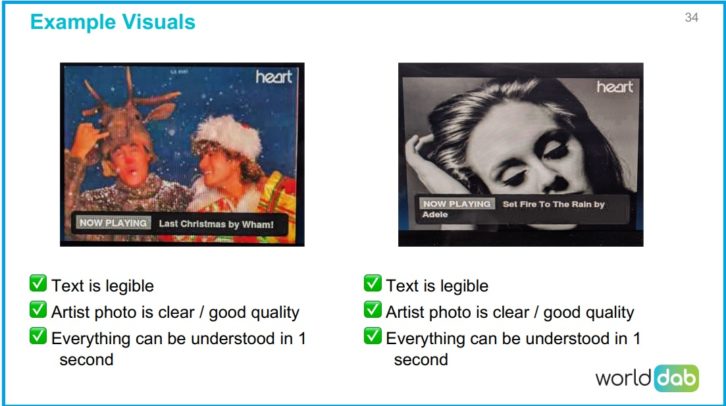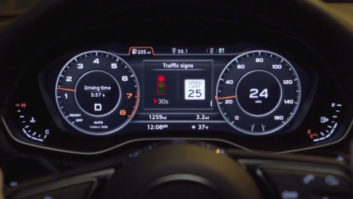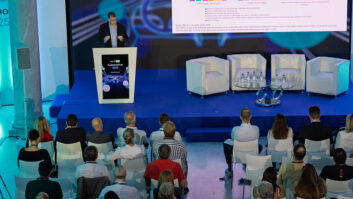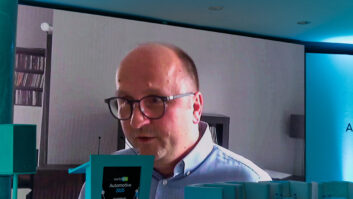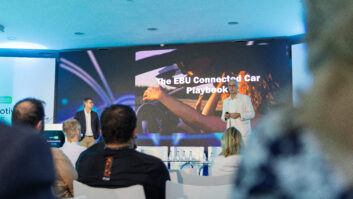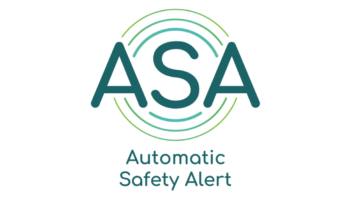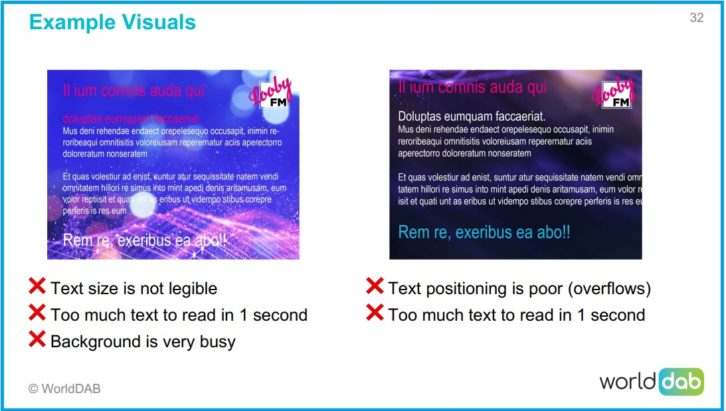
Driver distraction is a threat to public safety, says WorldDAB, and improperly designed graphics on car entertainment screens are a part of the problem.
To mitigate this threat plus the possibility of government regulation, WorldDAB has created “Driver Distraction Guidelines” for radio stations to make their in-car visuals safer and less distracting.
These guidelines were presented during the WorldDAB Automotive 2022 conference on June 22, held in person in London and online.
A Top 10 Problem
The presentation about the Driver Distraction Guidelines began with Harman Project Manager Tuner Development Rüdiger Hentze putting this safety issues into context.
“In the ranking of traffic accidents, driver distraction is in the top 10,” he told delegates.
“In Germany, depending on the statistics, it is between number 5 and 8 … Mobile phones, radio systems, and navigation are listed at main reason for distractions. Our recommendation is to limit the distractions based on visual services.”
To underline his point, Hentze noted that, in a car travelling at about 50 kilometers/30 miles per hour, looking at a radio display rather than the road for just a few seconds means that “you are driving between 30 and 40 meters blind.”
He added that overly bright display screens located close to the windscreen or on top of the dashboard can blind drivers at night. In the worst scenario of lost night vision, “you will not see the person or any other barrier on the street.”
Ways to Reduce Distraction
RadioDNS Project Director Nick Piggott took over at this point, to explain how WorldDAB’s Driver Distraction Guidelines can help radio graphics designers create safer visuals for in-car displays.
“We’ve identified three contributive factors to driver distraction: Legibility, relevance and frequency of updates,” he said. “When designing for digital radio, we need to consider all three of those.”
Legibility refers to creating on-screen song/artists titles and radio station information that is easy to read and understand with a quick glance.
“Some designers at radio stations really don’t understand how their content is going to be displayed (in cars), which is in stark contrast to the very clear understanding they have of how things look on mobile and how things look on desktop,” said Piggott.
“So we have far more detail in these driver distraction guidelines about how to design for screens in vehicles and how to check that your design’s legible, and that is followed up with a similar piece of information for manufacturers on how to present that design legibly.”
Then there’s relevance: “Every time you (radio stations) update content on the screen, it will cause a driver distraction,” he said. “So only put content on the screen that’s really helpful to the driver … We’ve also pointed out that it’s important for manufacturers to update content without driver intervention. We know that there are some digital radios, for instance, that require the driver to interact with the radio to do things like (load) slideshows or read text, and that’s making that distraction issue more of a problem.”
The term “frequency of updates” refers to how often broadcaster refresh their in-car visuals. To maximize safety, they need to strike a balance between keeping listeners informed while minimizing how often they change their screens.
“We’ve recommended a 20-second refresh interval,” said Piggott. “That means that a broadcaster knows how often they can send content. It also means that a manufacturer knows that they can implement blocking on bad broadcasters (who change screens more often than that) … to protect from unnecessary driver distractions.”
Being Proactive
By proactively formulating the guidelines, Piggott said, WorldDAB is not trying to override any existing driver distraction laws governing in-car graphics, but it is hoping to minimize the impetus for any further laws to be passed.
This being the case, Piggott urged delegates to get these Driver Distraction Guidelines into the hands of radio station graphics designers now.
“You’ve understood the background to them and why it’s important, and we’ve given you a brief overview of the content,” he concluded. “What’s important now is that you pick them up and you distribute them within your teams so that, as quickly as possible, we get to a shared understanding of minimized driver distraction.
As Rüdiger pointed out, we don’t (want to) find ourselves being legislated, for when we could have regulated this ourselves much more easily.”
Access the WorldDAB Driver Distraction guidelines (PDF).
